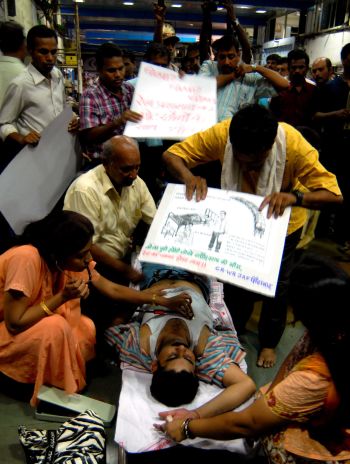 | « Back to article | Print this article |
Mumbai train strike: Govt invokes ESMA, 170 motormen held

The Maharashtra government invoked the Essential Services Maintenance Act on the striking motormen of the western and central railway in Mumbai on Tuesday, to bring an end to the train strike that has crippled the city since Monday evening.
Over 65 lakh people in the metropolis have been hit by the strike by nearly 1,100 motormen.
As many as 170 striking motormen were arrested for creating obstruction at the Chhatrapati Shivaji Terminus in Mumbai.
The state government has also set a three-hour deadline to the rest of the striking motormen to resume their duties.
The Mumbai train strike also rocked the Parliament on Tuesday as Members of Parliament of the Shiv Sena and Bharatiya Janata Party stalled the Lok Sabha, demanding immediate action to resolve the strike.
The two parties, the main opposition in Maharashtra, held Railway Minister Mamata Banerjee responsible for the imbroglio, and said she had failed in discharging her duties.
Sena and BJP MPs also brought the Rajya Sabha to a standstill, demanding a statement from Banerjee on the steps taken to resolve the strike.
Railway authorities said only 20 per cent suburban trains were operating. Twenty motormen have been dismissed for refusing to report for work.
Maharashtra Home Minister R R Patil said the state government will take up the issue with the Centre, seeking its intervention to provide relief to Mumbai commuters.
Maharashtra Chief Minister Ashok Chavan has called an emergency meeting to discuss the situation arising out of the motormen's strike. Police, railway and transport officials will attend the meeting, official sources said.
Chavan had met Prime Minister Manmohan Singh on Monday and requested his intervention to end the strike, the sources said.
The chief minister also spoke to Banerjee and requested her to take stringent action against the striking motormen, they said.
Police teams have been deployed at railway stations as a precautionary measure.
Though the motormen had reported to work on Monday, many of them fell ill and were hospitalised later in the day, thus hitting the services. The striking motormen have demanded higher pay and better working conditions.
Devendra Yadav, convenor of the Motormen Union addressed the media on Tuesday morning.
"The Railways promised us in writing on January 26 that they would increase our wages but nothing has been done in the last two months. Now, they are using dictatorial ways to break our unity but we all stand united," he said.
The hunger strike had begun affecting the services late on Monday evening when most motormen of the trains running on the central and western lines of the city came to grinding halt. Many office goers were stranded at offices and could not reach home until next morning.
On Tuesday morning, office goers had to resort to buses, taxis and autorickshaws to reach offices. Bus stops and buses were seen crowded. The western and eastern express highway also continued to be jammed with commuters opting for road transport to reach their destinations.
"I am going home and I have already informed my office that I won't be able to reach because of the strike," said Anoop Shah who was at the railway station at Borivli, a northwestern Mumbai suburb.
Students, who had examinations, also suffered due to the strike. The state government has ordered all exam centres to allow students to write their papers even if they reached their venues late.
Image: A motorman on hunger strike on Monday night | Photograph: Sahil Salvi